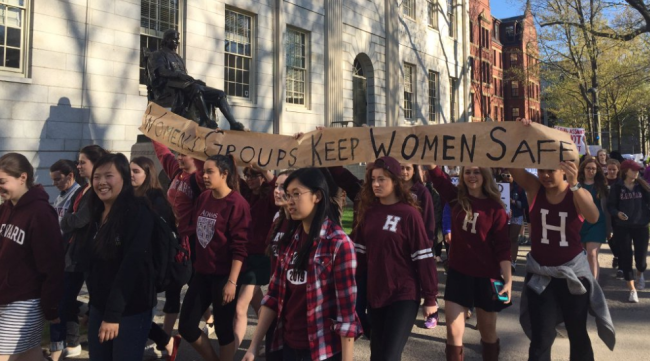You have /5 articles left.
Sign up for a free account or log in.

Female Harvard students protest the university's decision to bar students from joining unrecognized single-gender organizations.
Flavia Cuervo | Twitter
Looking to end “a system of privilege and oppression,” Northwestern University announced last week that most student groups on campus must begin admitting any interested students by next year or they will lose university funding. That could mean groups like the campus food magazine Spoon University and the student-run marketing firm Form & Function Marketing, which have in the past been selective, would have to take all who want to join.
The decision has its supporters, but also its critics, who argue that allowing anyone into any club will dilute the quality of a group’s membership. Similar debates are taking place at other institutions, with colleges reconsidering whether historically exclusive organizations should still have a place on their campuses.
“Colleges are being pushed by students to be more inclusive,” Kevin Kruger, president of NASPA: Student Affairs Administrators in Higher Education, said. “I think the era of elite clubs and secret societies, which have really excluded folks on the basis of criteria that colleges feel they shouldn’t endorse, is slowly ending. We’re moving toward a society and a university that’s trying to create more inclusive environments.”
Several institutions, including Amherst College and Wesleyan University, have banned all-male fraternities in recent years. Last year, Sigma Phi Epsilon announced that it would allow transgender men to join the fraternity. In a widely derided decision last October, the student senate at Pitzer College, a private institution in Los Angeles, rejected a proposed yacht club, saying the concept was too exclusive.
In 2014, Bowdoin College said it would no longer recognize the Bowdoin Christian Fellowship, a campus Bible study group, after it refused to agree to the college's policy that any student, no matter their religion, could run for election as leader of any student group. After similar incidents at California State University and Vanderbilt University, lawmakers in North Carolina passed a bill ensuring that Christian student groups in their state would be safe from such intervention.
Earlier this month, Harvard University barred its students from participating in several off-campus, single-gender groups after unsuccessfully urging the organizations to become coeducational. Those who choose to participate in the off-campus clubs would be banned from leadership positions on campus and from receiving prestigious awards. The move drew praise from those critical of Harvard’s exclusive, all-male final clubs, but elicited sharp criticism from organizations like the Foundation for Individual Rights in Education, which called the decision “a threat to freedom of association.”
At Northwestern, the plan to create more inclusive student groups has been in the works for five years, the university said.
The new policy would affect most groups that use an admissions process for recruiting new members, including the exclusive Institute for Student Business Education, a selective group that provides various educational and experiential learning opportunities to students working toward a career in business. Students can currently try to join ISBE through an application and interview process, though the club only accepts about one-third of the 200 or so students that apply each year.
The policy would exclude some groups, however, such as Sexual Health and Assault Peer Educators, a student club that works with victims of sexual assault and thus requires a selective membership process. Fraternities and sororities, which are recognized by Northwestern but are independent from the university, would also not be subject to the new policy. Certain sports and performance clubs could receive exemptions, as well, on a case-by-case basis, the university said.
“It’s a changing culture,” Brent Turner, executive director of the university’s office of Campus Life, told the student newspaper, the Daily Northwestern. “Student Affairs has a strategic plan and one of those tenets is to enrich the Northwestern community. What better way to do that than creating access and removing all the barriers for students to get involved?”
Some students disagree, saying they support the idea of a more inclusive campus but that requiring student groups to become open admission is not the solution.
“If there are no barriers to enter a student group, students would undoubtedly join for the sake of joining and organizations would be saturated with unmotivated students who don’t value the group as much as they would have had they faced an application process,” Jacob Altstadt, a columnist for Northwestern’s student newspaper, wrote. “Requiring open admission creates an equality of results -- rather than an equality of opportunity -- that incentivizes laziness and strips our campus of any semblance of motivation to innovate. Inequality of results is a fact of life.”
Added Cooper Wetherbee, a project manager in the analytics arm of the Institute for Student Business Education, “At a school that takes pride in being selective -- one that this year rejected almost 90 percent of the 35,000 applicants seeking admission -- it is both disingenuous and misguided to sacrifice the depth of students’ engagement in their extracurricular pursuits in order to promote so-called inclusivity at a superficial level.”
Attempts in recent months to force Harvard's final clubs to open their membership to women have also been met with resistance.
In March, Harvard University released a report of recommendations on preventing and dealing with sexual assaults on campus. The report was similar to many other sexual assault reports released in recent years, with recommendations that included creating more detailed policies and providing more prevention education and training to students.
Where the Harvard report differed was in its emphasis on the university’s final clubs -- wealthy, private, historically male-only organizations that have existed at the university for two centuries. Fraternities and sororities were also singled out in the report.
“A woman’s physical appearance is often seen as the basis for entry to these spaces, and female students described a general expectation that entering final club spaces could be read as implicit agreement to have sexual encounters with members,” the report read. “We understand that many of the clubs typically exclude nonmember men from parties, which gives an unambiguous frame to social events, eliminates nonmember male bystanders and enables a gender ratio that makes it easier for members to have a sexual encounter.”
Final clubs, as well as fraternities and sororities, are not officially recognized organizations at Harvard, but about 30 percent of students are members of the groups and the university has frequently urged the clubs to become coeducational. Most have refused.
Earlier this month, the university announced that new students who join any “unrecognized single-gender organizations” would not be eligible for leadership positions on campus, such as being a member of a sports team, or any prestigious academic awards, including the Rhodes Scholarship.
Members of Harvard’s male final clubs argue that they’re being treated unfairly by administrators. A letter by one club to its members last year after it reluctantly decided to become coed complained that “Harvard is unfairly scapegoating the final clubs for Harvard’s poor performance on sexual assault issues.”
While the recent focus on final clubs stemmed from the university’s report on sexual assault, university officials say the decision to ban students from single-gender clubs is part of a larger attempt to steer Harvard toward becoming a “truly inclusive” community.
“Over time, Harvard has transformed its undergraduate student body as it welcomed women, minorities, international students and students of limited financial means as an increasing proportion of its population,” Drew Gilpin Faust, Harvard’s president, said in a statement. “But the campus culture has not changed as rapidly as the student demography.”
Among those complaining about the change are Harvard’s six all-female final clubs and four sororities. Earlier this month, the organizations’ members protested the decision on campus and on Twitter. “What do we want?” female demonstrators chanted during one rally. “Female spaces! When do we want them? Now!”
In a statement, Harvard officials defended the decision, saying that “change is difficult and is often met initially by opposition.”
The female Harvard students argue that their groups are being punished for the behavior of their male counterparts -- that they are collateral damage of the university’s ongoing war with the final clubs. Their concern is shared by the National Panhellenic Conference, which released a statement earlier this month urging Harvard to “consider the ramifications this policy shift will have on programs and opportunities for women” on campus.
“When trying to break down these artificial barriers based on race or gender identity, there will be some issues of collateral damage that may not have been part of the original problem,” Kruger, of NASPA, admitted. “Universities are trying to focus on the larger good.”








